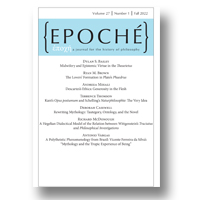|
|
|
21.
|
Epoché: A Journal for the History of Philosophy:
Volume >
17 >
Issue: 1
David Farrell Krell
Narrative as Trauma and Resilience:
Charles Scott's "Living with Indifference"
abstract |
view |
rights & permissions
| cited by
After listing a series of topics in Scott’s Living with Indifference that I would have wanted to address but, if only for reasons of space, could not, I focus on the uses of narrative or fiction in Scott’s book. I am particularly interested in the relation of fiction to trauma. It is the resilience of fiction that perhaps enables it to speak—or to write—so eloquently about traumatic occurrences. As a writer of fiction, I am gripped by the proximity and even intimacy of fiction and trauma in Scott’s thinking.
|
|
|
|
|
|
|
22.
|
Epoché: A Journal for the History of Philosophy:
Volume >
17 >
Issue: 1
Walter Brogan
The Middle Voice of Charles Scott:
The Intimacy of Attentiveness and the Life of Wonder
abstract |
view |
rights & permissions
| cited by
My essay attempts humbly to honor and celebrate the voice of Charles Scott by thematizing one of the major insights of his body of work, namely the significance of the middle voice. I attempt in various ways to show the significance of the middle voice in the work of Charles Scott and to offer some commentary on what is meant by the middle voice. Finally, I ask about the implications of a middle-voiced philosophy for an understanding of the self of human beings and for an understanding of the theme of indifference in relation to the lives of things that Scott addresses in his later work.
|
|
|
|
|
|
|
23.
|
Epoché: A Journal for the History of Philosophy:
Volume >
17 >
Issue: 1
James Risser
On Freedom in Another Sense
abstract |
view |
rights & permissions
| cited by
This paper assesses the philosophical project of Charles Scott, beginning with his first book, Boundaries in Mind, and including his most recent work on “Bordered Americans.” The interpretive focus for the assessment concentrates on what Scott early on characterizes as boundary awareness: the appearing of difference in appearance. In this context, it is argued that what is fundamentally at issue in Scott’s philosophy is a sense of freedom other than that which is associated with subjectivity and its presumed autonomy.
|
|
|
|
|
|
|
24.
|
Epoché: A Journal for the History of Philosophy:
Volume >
17 >
Issue: 1
Daniela Vallega-Neu
Bodily Being and Indifference:
An Encounter with Charles Scott's "Living with Indifference"
abstract |
view |
rights & permissions
| cited by
This essay engages Scott’s Living with Indifference by inquiring how we may understand experiences of indifference as occurring in our bodily being. It brings together Heidegger’s notion of being-there (Da-sein) and Merleau-Ponty’s accounts of world and body as flesh. With respect to Merleau-Ponty, the discussion highlights his thought of a “dehiscence” of body and world, which opens the idea of a hollow in the flesh that “echoes” indifferent dimensions accompanying the happening of things and events. The essay concludes with the insight that we can be attuned to indifference because we carry indifference with us in our bodies.
|
|
|
|
|
|
|
25.
|
Epoché: A Journal for the History of Philosophy:
Volume >
17 >
Issue: 1
Michael A. Deere
Gappiness in Dimensional Accounts
abstract |
view |
rights & permissions
| cited by
The work of Charles Scott bears a lightness that enlivens his thinking and writing. In the spirit of such lightness, I argue for gappiness and dimensionality as ways of thinking indifference and liveliness in Scott’s accounts of things. Through a close reading of Starlight in the Face of the Other, I show that gappiness happens with indifference in senses of galactic space and exceeds the philosophical and historical lineages of alterity. Through the functions of recoil and the subjunctive mood in Scott’s work, I show that dimensionality characterizes the liveliness of thinking in attunement to indifference. I conclude with an indifferent and dimensional account of the space of disclosure in thinking.
|
|
|
|
|
|
|
26.
|
Epoché: A Journal for the History of Philosophy:
Volume >
17 >
Issue: 1
John Lysaker
Finding My Way through Moral Space:
A Whim-Wham for Charles Scott
abstract |
view |
rights & permissions
| cited by
The ongoing task of self-discovery, which I figure as self-finding, following Emerson, is integral to the human condition. While its results are always fragmentary, self-finding also conducts the currents of life in ways that establish conditions for our lives and those of others. This activity is mistakenly constrained by Charles Taylor, who argues that it remains tied to moral space. Charles Scott’s work shows how moral space can be found in a manner that suspends the necessity of moral space and generates new possibilities.
|
|
|
|
|
|
|
27.
|
Epoché: A Journal for the History of Philosophy:
Volume >
17 >
Issue: 1
John Sallis
Once Again:
What's the Matter with "Nature"?
abstract |
view |
rights & permissions
| cited by
This paper resumes my discussion with Charles Scott concerning the concept of nature. The discussion stems from Scott’s book The Lives of Things, and this paper is prompted by a short text (appended to this paper) in which Scott elaborates and clarifies certain significant points. The focus of the discussion is on the double sense of nature, that the word can designate, at once, both natural things in their singular happening and the eidetic double, the essence, of such things. The key issue is the way in which the second, eidetic sense folds back over the first, singular sense so as to conceal it.
|
|
|
|




